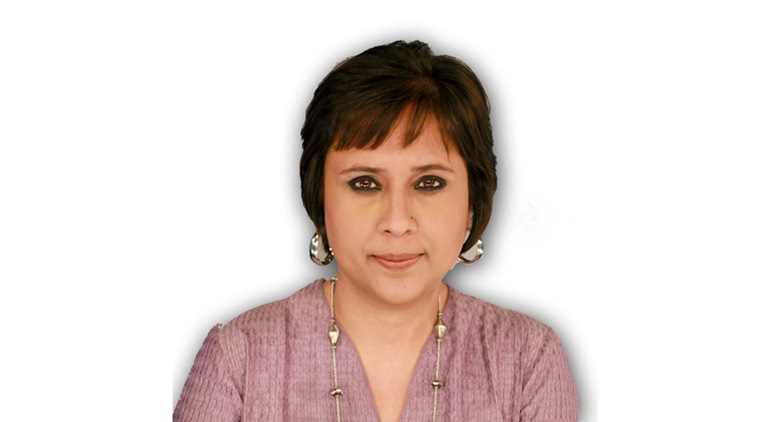
In India, even today, when you purchase sanitary pads from the neighborhood store, you can expect the (usually male) shopkeeper to evade your eye. He will wordlessly get a packet from the rear of the store and slip it into a jet-black plastic bag so that no one can see what you bought. It is like a shroud thrown over your monthly awkwardness. One of the big sanitary-napkin brands is called Whisper, a perfect metaphor for how your period should be spoken of - if you must mention it at all.
I am an unabashed, proud feminist. But the social conditioning around menstruation in India is so entrenched that, in my younger years, if I suddenly needed to ask a colleague for a sanitary pad at work, I would carry it wrapped in a newspaper or office stationery.
Our menstruation has been used against us in all sorts of ways - to shame us, embarrass us, sexually repress us and, of course, make us feel dirty. Muslim women have told me they are not allowed to offer Namaz prayers during their period. Hindu women have had to petition in court to be allowed inside temples that bar menstruating women. There are homes where girls and adult women are not allowed into the kitchen during their "impure" days.
Now comes a bizarrely paternalistic and silly proposal to further ghettoize us. A campaign in India has urged providing women a day off for the first day of their periods. I didn't take this idea seriously when I first heard it. It seemed like the self-indulgent mumbo-jumbo of so-called post-feminists. To my shock, the issue has become a major point of discussion. One media outlet has even adopted this harebrained policy for its female employees.
"First-day period leave" may be dressed up as progressive, but it actually trivializes the feminist agenda for equal opportunity, especially in male-dominated professions. Worse, it reaffirms that there is a biological determinism to the lives of women, a construct that women of my generation have spent years challenging. Remember all those dumb jokes by male colleagues about "that time of the month" or PMS? Well, this idea only serves to emphasize that there is something spectacularly otherworldly about a bodily function.
Sure, our periods can be annoyingly uncomfortable and often painful, but this reality usuallydemands no more than a Tylenol or Meftal and, if needed, a hot- water bottle.
In rural India, gaps in menstruation hygiene, social stigma, lack of access to affordable sanitary napkins or toilets, and an absence of disposal mechanisms for pads all keep girls away from school. A U.N. report confirms that 20 percent of Indian girls drop out of school after reaching puberty; in sub-Saharan Africa, 1 in every 10 girls misses school during her menstrual cycle. In Nepal there are "menstrual huts" where women are isolated.
Around the world, menstruation has been a basis for barriers. (Who can forget then-candidate Donald Trump's sexist swipe at TV host Megyn Kelly when he said she had "blood coming out of her wherever"?) Girls can be denied an education because of cultural taboos, relative poverty and lack of basic facilities during a period - and here are we, elite and spoiled women, demanding the right to stay at home. Does no one see the irony?
Female labor-force participation has declined in India despite economic growth. Only 27 percent of Indian women are in the workforce, the lowest level among the emerging BRICS nations (Brazil, Russia, India, China and South Africa); among Group of 20 countries, India's rate is better than only Saudi Arabia's. Instead of focusing our feminist energy on such alarming statistics, goofy ideas such as period leave create grounds for workplace discrimination or, worse, a denial of some roles completely.
Take the fight for the right of women to be allowed into military combat, fly fighter jets or be sent into space. The barriers are high enough already; now we want to add a nonsensical new one? In 1999, when war broke out between India and Pakistan in Jammu and Kashmir, I had to push hard to be allowed to report from the front lines.
"There are no bathrooms, no separate beds for women," said an initially reluctant army. I pleaded and argued my way in. But imagine if this blanket plea for period leave existed; what might the army have said to me? Incidentally, I was menstruating while reporting from the front lines.
Some women have raised the issues of endometriosis and extreme menstrual pain. I sympathize - but those are a basis for medical leave, not grounds to make such exceptions the norm as menstrual leave.
Others have noted that maternity leave is also a female-specific benefit and asked me why I don't object to that. First, I don't think maternity and menstruation are comparable; second, I do think it's time for the feminist framework to focus on equality at home as a key component of equality at work.
I'd be much more comfortable with the idea of family leave, available to both men and women, so that we finally will have crossed the final frontier of stereotypes.
But for women to use the fight against menstrual taboos as an excuse for special treatment is a disservice to the seriousness of feminism. Stop this sexism. Period.
Dutt, a broadcast journalist based in New Delhi and author of "This Unquiet Land: Stories from India's Fault Lines."


 Contact The Editor
Contact The Editor
 Articles By This Author
Articles By This Author